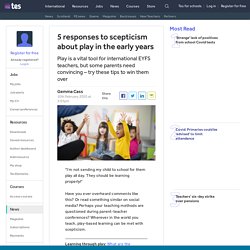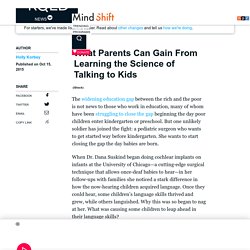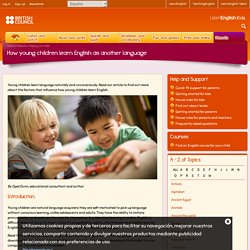

Cory Burgos
Serve and Return. Quality Interactions Early Years. The Brain-Changing Power of Conversation. The Science Researchers used highly faithful audio recorders — a system called Language Environment Analysis (known as LENA) — to capture every word spoken or heard by 36 4–6 year olds from various socioeconomic backgrounds over two full days.
The recordings were analyzed to measure the number of words spoken by each child, the number of words spoken to each child, and the number of conversational turns — back-and-forth exchanges initiated by either adult or child. Comparing those measurements with brain scans of the individual children, the analysis found that differences in the number of conversational turns accounted for differences in brain physiology, as well as for differences in language skills including vocabulary, grammar, and verbal reasoning.
Read the MIT News story for a fuller summary of the research. The Takeaways The “conversational turns” are key here, the researchers say. 5 ways to win over parents to the importance of play in international EYFS. "I’m not sending my child to school for them play all day.

They should be learning properly! " Have you ever overheard comments like this? Or read something similar on social media? Perhaps your teaching methods are questioned during parent-teacher conferences? Wherever in the world you teach, play-based learning can be met with scepticism. Learning through play: What are the benefits? Digital storytelling: 4 steps to create digital stories for language learning Early years foundation stage: Everything you need to know. Taking Playtime Seriously. So part of encouraging play is pulling back on how much programmed goal-directed learning we expect from very young children, to leave them time for the fun of exploration, curiosity and, well, fun.
But another important part may be creating environments that foster children’s play and parents’ participation and attention. Dr. Hirsh-Pasek, who is a senior fellow at the Brookings Institution, cited its Learning Landscapes Initiative, which aims to set up learning opportunities in public places where people will encounter them. One of these, the Urban Thinkscape project in Philadelphia, involves puzzle benches at bus stops, with puzzles designed to build STEM skills.
Before the benches were installed, she said, parents waiting for buses were almost uniformly looking at their cellphones. David whitebread importance of play report. Patricia Kuhl: The linguistic genius of babies. Alison Gopnik: What do babies think? KQED Public Media for Northern CA. There was a direct correlation between the children who’d heard a lot of parent talk and how prepared they were to learn once they arrived at school.

Hart and Risley wrote, “With few exceptions, the more parents talked to their children, the faster the children’s vocabularies [grew] and the higher the children’s IQ test scores at age 3 and later.” For Suskind, a lightbulb went on. “The truth is, much of what you see in children born into poverty is analogous to children born deaf,” Suskind said. “It’s a really important point. The most fundamental science shows that it’s really language, and all that comes with it, the brain-building aspect of things, that makes a difference.”
Bringing Parents On Board In Suskind’s new book, "Thirty Million Words," she explains the research behind the word gap in detail, along with her research-based initiative of the same name, aimed at boosting children’s brains in the first three years of their lives. . * Tune In. . * Talk More. . * Take Turns. How young children learn English as another language. By Opal Dunn, educational consultant and author Introduction Young children are natural language acquirers; they are self-motivated to pick up language without conscious learning, unlike adolescents and adults.

They have the ability to imitate pronunciation and work out the rules for themselves. Any idea that learning to talk in English is difficult does not occur to them unless it’s suggested by adults, who themselves probably learned English academically at a later age through grammar-based text books. Read the notes below about young children learning English as another language. The advantages of beginning early Young children are still using their individual, innate language-learning strategies to acquire their home language and soon find they can also use these strategies to pick up English. Stages in picking up English Spoken language comes naturally before reading and writing. Understanding Frustration Mistakes.